1. INTEGRATED REHABILITATION CENTRE FOR ADDICTS (IRCA)
NISTHA: The Drug De-Addiction–Cum-Research Centre was a 15-bedded facility functional at Bhubaneswar since 1997. The centre equipped with adequate infrastructure as well and well trained / experienced professionals provided the whole range of de-addiction services that encompassed motivational counseling, detoxification, de-addiction, rehabilitation & after care besides prevocational skill training and social support services. It used to act as a referral center-receiving patients from across various states. The center established a land mark in the level of success rate of de -addiction.
The organization was strengthened and restructured as Integrated Rehabilitation Centre for Addicts (IRCA) supported by the Ministry of Social Justice & Empowerment, Govt. of India since 2007- 2008. The primary objective of the center is the behavioral research that relates to forms and patterns of drug use, factors influencing initiation/continuation of drug use and development of harm reduction, aftercare and follow-up procedures etc.
The Daily Activity at IRCA :

The everyday activity of IRCA is summarized below :
At 6.30 AM wakes up call is given to the patients and morning tea is served. After the refreshment the patients are gathered together in the Hall and are guided by the Yoga Therapist for the session of Yoga and Physical Exercise from 7.30 to 8.30 AM.
After that they relax and finish their bathroom chores .Then breakfast and tea is served and medicine is distributed within 10 AM.

Individual counseling Sessions are taken between 10 to 11 AM. Patients share their feelings, views, problems if any and status in the recovery program with their respective counselors and are well guided for further progress.

Re-educative sessions for the clients are taken between 11 AM and 12 Noon as per the schedule. Sometimes re-educative sessions for the family members are also taken, the timing for which is fixed earlier and they are informed well in advance.

From 12 Noon to 1.00 PM again some Individual Counseling Sessions are taken for those left out, if the counselor feels that it is required for the patient. Others either relax or play some indoor games or go to sleep if they feel like.

Lunch is served between 1.00 to 2.30 PM and patients take rest from 2.30 to 4.30 PM. After that between 4.30 to 5.30 PM patients are engaged in recreational activities such as playing Chess ,Ludo ,Carom, Cards etc. , watching T.V or Listening Music. Afternoon tea is served during this period with L.P reading on fixed dates. On 3rd Sunday of every month during this period NA Information Session is taken.
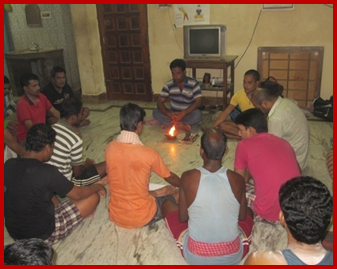
5.30 PM to 6.30 PM is the time for AGNIHOTRA followed by Spiritual Discourse. Patients get refreshed , wash their hands and legs and participate in the Agnihotra (a small Yagyan) with chanting some Hymns. Then some spiritual discourse is given for 20 to 30 minutes to develop their moral standards.
Treatment model:
The treatment model adopted by IRCA essentially involves admitting patients to the de-addiction centre. The treatment program includes detoxification, intensive psychological therapy and follow-up. Detoxification takes place for a period of 7 to 10 days. After detoxification, the patient undergoes an intensive three weeks in-patient therapeutic programme, which includes individual counseling, lectures, group and family therapy, relaxation techniques and recreation. The aftercare / follow-up services are provided on an ongoing basis in an out-patient set up. The comprehensive in- patient treatment program essentially involves the family of the addict.
The behavioral procedures used in the broad spectrum treatment programme include psychotherapy, relaxation techniques/ stress reduction training, self-control training, social skills and assertiveness training, individual/ group counseling, family counseling, vocational exposure and counseling, exposure to self-help groups etc.
DISTRIBUTION OF PATIENTS’ DATA
As per registration and performance :
Total number of 228 patients were registered during the period April 2015 to March 2016 in the centre out of which 132 are first time registered in indoor and 96 are revisited cases.
210 cases completed treatment and 18 dropped out during the treatment period. Out of those who completed treatment during the report period, 140 are sober, 65 relapsed, and 5 patients have no news. The age group of the indoor patients ranged from 16 – 65 years. The number of cases registered in the OPD is 309.
As- per the Choice of Drug :
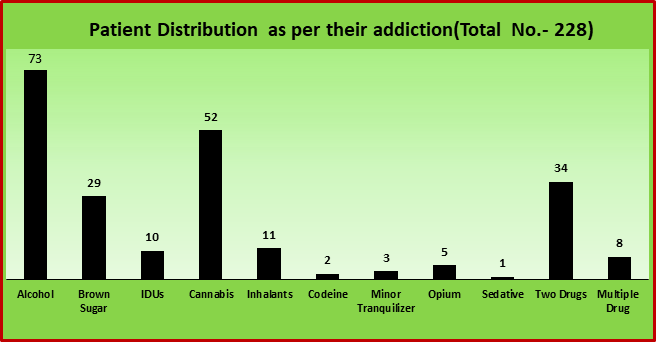
Among the 228 patients who were registered in indoor during the period April 2015 to March 2016 , 73 were Alcoholics, 29 Brown Sugar addicts, 10 IDUs, 52 Cannabis addicts, 11 abused Inhalants, 2 abused Codeine, 3 abused Minor Tranquilizers , 5 abused Opium and 1 abused Sedatives. As much as 34 were abusing Two Drugs while 8 were Multiple Drug Abusers.
As per Marital Status :
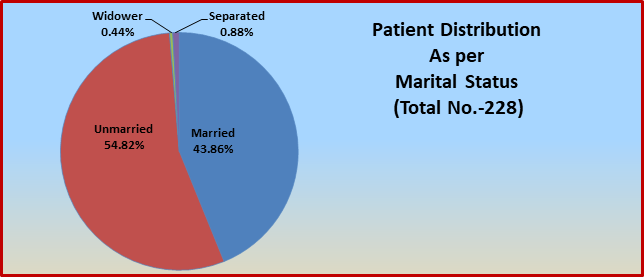
Among the clients admitted during the reference period, 125 cases are unmarried, i.e. around 54.82%. While 100 are married, i.e. 43.86%, 1 is widower, and 2 cases are separated due to drug abuse.
As per Educational Status :
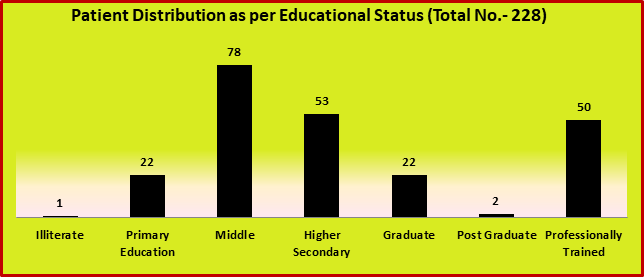
Out of 228 patients who received treatment in indoor only 1 was illiterate, 22 completed Primary Education, 78 were up to Middle, 53 completed Higher Secondary, 22 were Graduate, 2 were Post Graduate and 50 were Professionally Trained
As per Employment Status :
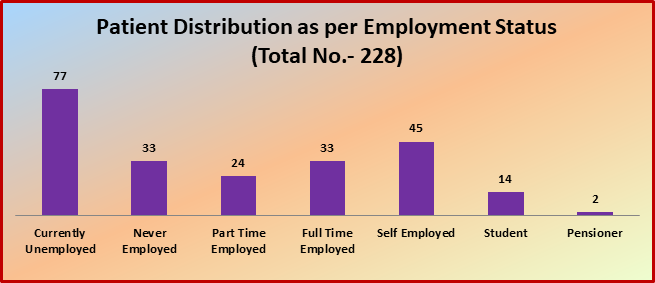
Regarding employment status, 77 were currently unemployed, 33 never employed, 24 part-time employed, 33 full time employed, 45 self employed, 14 students and 2 pensioners
Rehabilitation Programs Given :
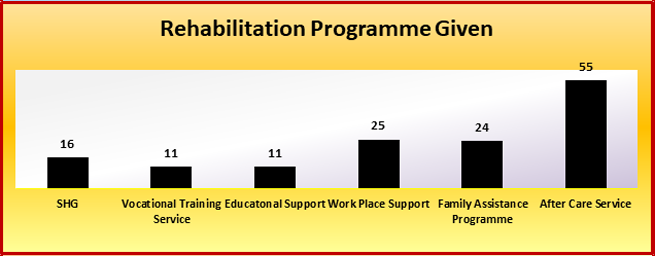
The IRCA is working sincerely for the Rehabilitation of recovering addicts through appropriate vocational training and networking .This year also we have helped 6 addicts to receive the training program on Mushroom cultivation given by the Odisha University of Agriculture and Technology (OUAT), Bhubaneswar .They completed the training successfully and are trying to get self employed by this.
Human Resources:
The centre is staffed by Psychiatrist, Psychologist, Counsellors, Social Workers, Recovering Addicts, Yoga Therapist and Ward Boys etc.
Allied Activities:
- Awareness building on Drug Addiction: production and distribution of IEC material, community sensitization and mobilization program, school health programs (sensitization of teachers, parents, students)
- Outreach programs: screening, referral services, training of volunteers, Peers educators, community level co-curricular activities
- Forum for Drug Abuse Prevention: coordination among voluntary organizations engaged in the field of drug de-addiction to establish linkages in the programmes being offered by them, and to ensure convergence of services in the area of their operation.
Networking between various stakeholders, facilitation of self helps groups, vocational training services, family assistance program etc.
2. EMPATHY”, THE REHABILITATION-CUM-RESEARCH CENTRE FOR THE MENTALLY ILL
It is a Half Way Home with provisions of 15 beds for care of the treated/ controlled mentally ill (male). It provides comprehensive & interdisciplinary care management as mental health counseling, clinical case management, and rehabilitation for the Mentally Ill. The Centre was formally launched on 4thNovember, 2004. The centre mainly deals with Substance-related disorders class of mental illness associated with the misuse of alcohol, nicotine, caffeine and illicit drugs.
Mental illness is a term used to describe a range of clinically diagnosable disorders that significantly interfere with an individual’s cognitive, emotional or social abilities. The stress of modern life has led to more and more people falling prey to the most common type of mental illness known as depression. Mental disorder is fast becoming the most common form of illness not only among the adults but also amongst the children.
The centre aims at improving outcomes for people with a clinically-diagnosed mental disorder through evidence-based treatment. The patients are provided a combination of medication and supportive psychological therapies on an inpatient basis. Medication is commonly prescribed for mental illness and has proved itself to be an increasingly effective tool. Psychotherapy addresses the emotional response to mental illness. Psychotherapists help patients understand their emotions and deal with their problems in a more confident, healthy way. Group psychotherapy, led by a psychotherapist, allows patients to draw emotional support from others with similar problems. Occupational therapy helps patients return to daily living skills and routines that may have been impaired by mental illness. The underlying stress is “psycho-social rehabilitation” which emphasizes the need to integrate a person in the society. An array of counseling related services are provided to address the social, psychological, environmental, vocational, educational and living needs of the individual and his family in order to assist the individual in achieving optimal access and community integration. The treatments of medication, psychotherapy and supportive therapies are tailored to the individual patient’s needs under the close supervision of a psychiatrist.
Human Resources:
Selected mental health services provided by General Practitioners (GPs), Psychiatrists/ Psychologists, Counselors, Social Workers, Occupational Therapists, Ward Boys.
3. EROS: THE COMMUNITY CARE FOR PEOPLE LIVING WITH HIV/AIDS:
It provides comprehensive and compassionate care and support to the People Living with HIV/AIDS (PLWH/A) The patients are assisted in coping with their illness. The goal of care was to promote the quality of life of the PLWH through the control of symptoms whether they are physical, psychological, social or spiritual. It was evident from the experience that success in the fight against HIV / AIDS required care and support interventions to accompany prevention activities. Availability of care could reinforce HIV prevention, reduce stigma, stabilize communities and provide hope for those who were infected.
PLWHAs have a variety of needs (medical needs, psychological needs, social welfare needs etc) and problems that relate to their HIV status. These may be specific to a particular disease process or they may be legal, related to work, educational, spiritual, emotional, social, making a will etc. In keeping with these various needs of the PLWH/As the essential components of the care were being planned.
Linkages with the Missionary of Charities, Kolkata and Medical College & Hospital, Vellore were established for medical care of the HIV positive individuals. Over 100 HIV positive were provided care and support services. After launching of the Care and Support Scheme under the National AIDS Control Program, Govt. of India, the activities of the organization are now restricted to awareness building, preventive interventions on Intra Venous Drug use, counseling, alliance building, peers development training, referral support etc.
Networking /Alliance Building: EROS networks with various HIV Positive networks in the State and outside for protection and promotion of HIV people’s rights for example SHRADHA-a state level network for Rights and Dignity of Women Living with HIV/AIDS, Orissa AIDS Solidarity Forum – a collective for protection of the rights of PLWA
